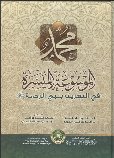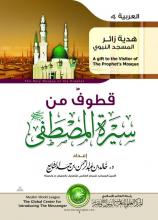The Best Role Model
The most conspicuous quality of Muhammad was his unselfish struggle for the cause of Islam and sacrifice of his personal comforts for other people. He sacrificed all, even the love and comfort of his most dear ones, for Islam and for the convenience of other people. He loved his daughter, Fatima, so much that he used to stand up with an abundance of love for her and kissed her forehead whenever she came to see him. She lived in extreme poverty and herself worked on a wheel to grind flour and brought water from the well.
Now let us discuss the various aspects of his life one by one and see why it is said that he was a perfect man. Muhammad was very polite and good-mannered. His wife, A'isha, and many of his companions, including Anas and Ali, reported that he was good-tempered, good-mannered and very polite to all. He was always happy and smiling and his face always had a bright and cheerful look. Abu Ishaque reported that Al-Bara was asked whether the face of Muhammad was as bright as a sword.
by Abdulaziz S. Al-Shoumar
Narrated Um Qais bint Mihsin:
I brought my young son, who had not started eating (ordinary food) to Allah's Apostle who took him and made him sit in his lap. The child urinated on the garment of the Prophet, so he asked for water and poured it over the soiled (area) and did not wash it.
Sahih Bukhari, Volume 1, Book 4, Number 223
Narrated Abu Qatada Al-Ansari:
Al-Haafidh Ibn Rajab al-Hanbalee
The Prophet sal-Allahu 'alayhe wa sallam chose the station of al-Ubudiyyah (slavery and servitude) over and above the station of kingship. Once - on the day of the conquest of Makkah - a man stood-up (out of reverence) for the Prophet sal-Allahu 'alayhe wa sallam, who, being shocked, said to him:
“Do not trouble yourself! Indeed, I am not a king. Rather I am merely the son of a Qurayshi woman who eats dry meat.” [Ibn Maajah (no.3312) and al-Haakim (3/47)]
Jundob Ibn 'Abdullah al-Bajali reported that the Messenger of Allah (SAWS) sent a group of Muslims to fight some mushrikeen (non-believers), and they met in battle. One of the mushrikeen was ambushing individual Muslims and killing them. One of the Muslims wanted to catch him out and kill him. Jundob said, "We used to think that that man was Usamah Ibn Zayd.
Muhammad was a very simple person and spent all his life in simplicity. He was very unceremonious and informal in his habits. He ate whatever he was given, wore very thick and coarse cloth, even when he was the ruler of a state and undisputed leader of the people. He sat on the floor, bare ground or a mat without any hesitation, alone or in the company of other people. He ate bread made from coarse flour and even spent days on mere dates. He wore simple clothes and did not like display or show. He was by nature simple and liked simplicity and informality in everything.
It was a settled principle with the Prophet that he always kept to the fore his own kith and kin and those who were nearer to him in facing a risk or hazard but allotted them the last place in distributing favours and rewards and spoils of war. When the three well-known swordsmen of Quraysh, 'Utba b. Rabia, Shayba b. Rabi'a and Walid b.
The holy Prophet was the Messenger of God, the chosen and the exalted, whose all sins, foregoing and coming, had been forgiven by the Lord, yet he was the most painstaking, eager and earnest in paying homage to God.
Muhammad was a perfect example of moderation to his followers in every walk of life. In expenditure, he advised them to spend within their means, neither to be so lavish as to make themselves destitute, nor to hold back their wealth from those who had a claim on their resources.
"Do not hold back altogether out of miserliness and render yourself blame worthy, nor spend without restraint and exhaust your wealth, thus becoming yourself destitute."
[Qur'aan 17:29]
In his good manners, gentleness, cordiality, sympathy and forbearance the Messenger of God has left a perpetual and living example of noble behaviour for the entire humanity. To tell the truth, he stood on such an exalted plane of graceful and polite deportment that God has paid him a glowing compliment in the Qur'an. "And verily thou art of a high and noble disposition." The Apostle once told the companions, "God has Himself disciplined me and disciplined in the best manner."






.jpg)

